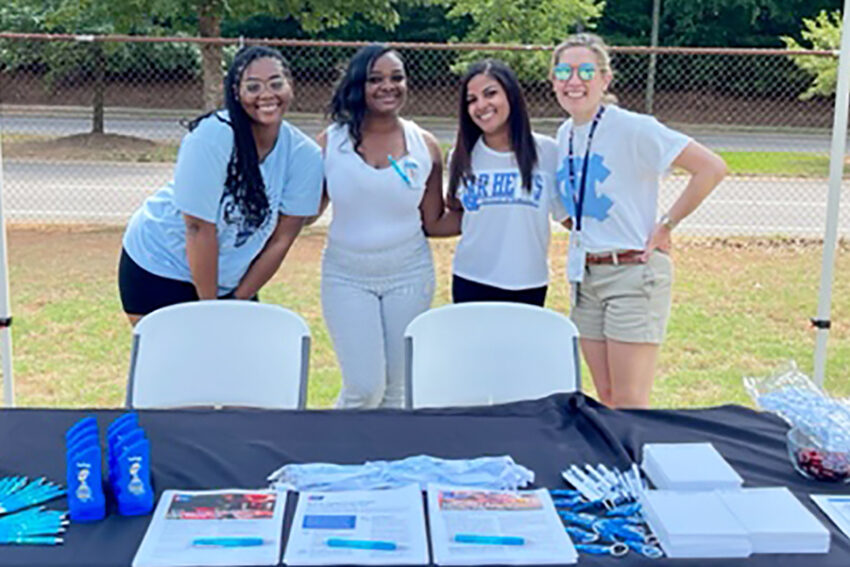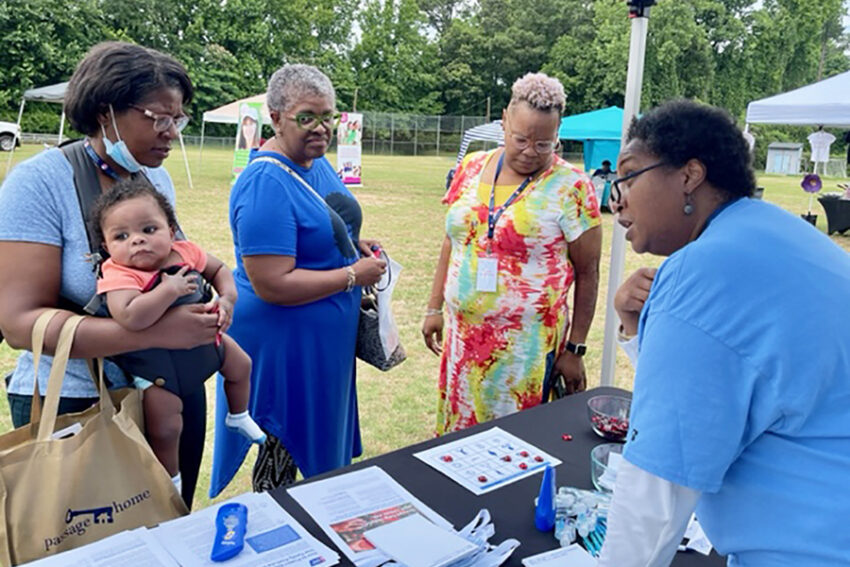An initiative designed to increase representation among underrepresented minorities in science just wrapped its inaugural year with a symposium featuring presentations by the participants about their experiences and the program as a whole.
The UNC Lineberger and North Carolina Central University Clinical Research Summer Internship, a new partnership between UNC Lineberger and NCCU, provided an opportunity for five NCCU students to participate in the 10-week program at UNC-Chapel Hill to learn firsthand about clinical research and oncology careers as well as to conduct clinical research with their mentors.

Lack of diversity and staffing turnover in clinical care has been an ongoing problem nationally, and this internship was part of a drive to increase representation in the sciences across North Carolina among Black, Indigenous and people of color, particularly in this area. The National Cancer Institute, with the goal to address these issues, has designated funds in cancer center support grants to increase diversity, equity and inclusion.
The internship stemmed from UNC Lineberger’s Ashley Leak Bryant, PhD, RN, OCN, FAAN, and her interest in recruiting a diverse workforce and combatting clinical turnover, a problem linked to burnout and lack of engagement.
Building a culturally sensitive careforce
“We need a culturally sensitive careforce to meet the needs of individuals with cancer, families, and communities in North Carolina. UNC Lineberger is committed to increasing and retaining a racially and ethnically diverse careforce through intentional collaboration with meaningful impact,” Leak Bryant said.
With support of UNC Lineberger Director Shelley Earp, MD, and the senior leadership team, and utilizing a grant from the V Foundation, Leak Bryant worked closely with UNC Lineberger’s Carrie Lee, MD, MPH, and the cancer center’s Clinical Research Training Education and Coordination (CRTEC) program to develop the internship.
Eleven students interested in careers in oncology, biology and nursing applied for the internship, and five were selected to participate: Kaitlinn Clanton, Imani Davis, Arianna Delts, Chrystal Feliz-Guzman and Cristian Rodriguez.

The interns were paired with mentors based on their interests. The internship consisted of a two-week orientation (which included clinical trials training), four weeks of professional development, and four weeks of clinical rotations. Clinical rotations covered a variety of areas including lung cancer, breast cancer and leukemia. Professional development topics included communication, LinkedIn profiles, career panels, CVs and resumes, and financial literacy. The interns will return next summer for another 10-week program.
Interns’ perspective
Interns also participated in a pre-and post-internship survey, which will be used to examine the impact of the program.
“I was drawn to this internship because I had an aunt that passed from cancer a few years ago, and I was interested in learning more as well as seeing the experience of other cancer patients. Also, I was very excited about the opportunity to shadow doctors since I have thought about medical school, but now I am on the PA route,” Delts said.
“I was excited to learn more about oncology and get experience in the hospital/clinic setting. It sounded like a unique opportunity to get introduced to health care, since this is the field I plan to work in,” Davis said.
Community Day, an event that brought together providers of housing, health and hygienic resources with the communities they serve, was also a highlight for the interns.
“It was very humbling to see how many people within the community [had] already fought/currently fighting cancer,” Feliz-Guzman said. Clanton said she enjoyed spending time with the physicians during Community Day.
In addition to sparking an interest in serving a multicultural community and recruiting a diverse workforce, the program is working to increase the number of underrepresented minorities who participate in clinical trials.
Creating equity in care and outcomes
“Everyone has a different lived experience, which is influenced by many factors including race,” said Andrea Walens, PhD, assistant director of collaborative science at UNC Lineberger. “When you experience an extremely stressful experience, like a cancer diagnosis, it feels important to know that your provider has a similar lived experience as it will shape their ability to care for you and understand any adversity you may experience during treatment. Therefore, by increasing diversity in our clinics, we are providing a safer space for our Black and Brown constituents and creating more equity in care and outcomes.”
The interns have a wide range of future plans, such as graduate school, physician assistant school and nursing school and said their internship experience was a good step for their future careers.
Rodriguez said he “gained more confidence in being able to interact with other professionals” as well as gaining experience into the patient treatment experience.
“It is a great way to see the inner workings of health care and learn about oncology,“ Davis said.
Next year, if funding is secured, the program will recruit another class of interns for the summer.
“We are currently growing the internship support team and are already busy planning ongoing touchpoints for mentors/mentees and brainstorming the curriculum for next summer. Diversifying our oncology workforce is one of the necessary pieces to ensure delivery of high-quality care to the cancer patients in our communities,” Lee said.
—Ashley Smith
